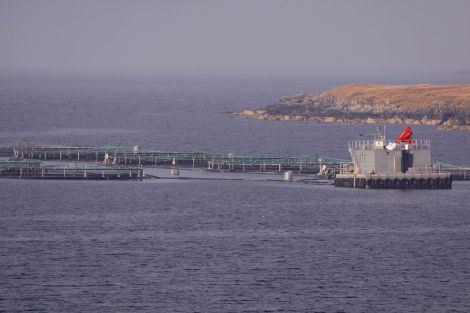News / Some isles salmon farms rated ‘poor’ by SEPA
ELEVEN salmon farms in Shetland were rated as ‘poor’ by environmental protection agency SEPA in 2016.
A freedom of information request from campaigner Don Staniford shows that four Scottish Sea Farms sites, four Cooke and three Grieg farms all breached SEPA assessment limits due to unsatisfactory bethnic surveys.
They were Cooke: Basta Voe, Uyea Sound, Bastaness and Djuba Wick; Greig Seafood Shetland: Collafirth Ness, Bight of Foraness and South Linga; Scottish Sea Farms: Vidlin Ness North, Loura Voe, Mangaster Voe and Laxo.
SEPA’s ‘poor’ rating is the second worst, with only ‘very poor’ following.
Scottish Salmon Producers Organisation chief executive Julie Hesketh-Laird said that while there were some “disappointing” results across the country, the majority of the industry had performed well.
It follows a report from the Scottish Parliament’s environment committee earlier this year that said there may be “irrecoverable damage to the environment” if the impact of salmon farming isn’t addressed before the industry expands further.
It was reported in February that 51 fish farming sites in Scotland had been rated by SEPA in 2016 as “at risk, poor or very poor” – but only now have their full identities been revealed.
That year £176 million worth of farmed salmon was produced in the isles, with Shetland accounting for 23 per cent of Scotland’s total weight, while in 2017 there were 421 people employed locally in the industry.
Staniford has now called on SEPA to “immediately close down all salmon farms guilty of systematic non-compliance and perennial poor performance”.
“Expanding salmon farming in Scotland yet further with a doubling or even trebling by 2030 would be sheer lunacy,” he added.
“Hopefully the forthcoming report into salmon farming by the Scottish Parliament’s Rural Economy & Connectivity Committee – expected ‘in the early autumn’ – will clamp down on the poor practices endemic in Scottish salmon farming.”
Become a member of Shetland News
Hesketh-Laird said: “The salmon farming industry takes its environmental responsibilities very seriously.
“SEPA’s 2016 Compliance Assessment Scheme results published in October 2017 show that 85 per cent of all Scottish salmon farms were rated excellent or good.
“Regrettably, there were some disappointing findings and the companies continue to work with SEPA towards improvements in these particular areas.”
Become a member of Shetland News
Shetland News is asking its many readers to consider paying for membership to get additional features and services: -
- Remove non-local ads;
- Bookmark posts to read later;
- Exclusive curated weekly newsletter;
- Hide membership messages;
- Comments open for discussion.
If you appreciate what we do and feel strongly about impartial local journalism, then please become a member of Shetland News by either making a single payment, or setting up a monthly, quarterly or yearly subscription.























































